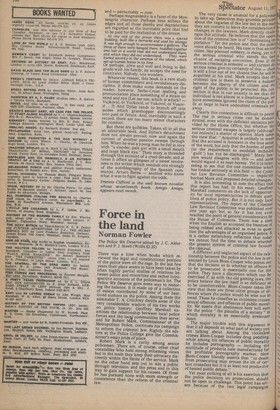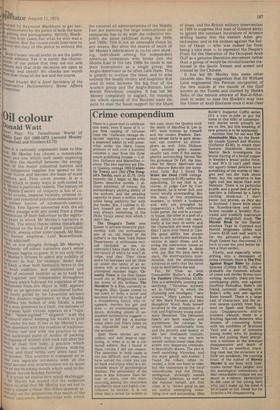Force in the land
Norman Fowler
The Police We Deserve edited by J. C. Alderson and P. J. Steed (Wolfe £2.25) There was a time when books which reviewed the legal and constitutional position of the police were all the rage. In the last few years their place seems to have been taken by often highly partial studies of relations between police and minorities and rather introspective accounts of the policeman's lot. The Police We Deserve goes some way to restoring the balance. It is made up of a collection of essays contributed by some of our bestloved authors on the police. Among them the admirable T. A. Critchley distills some of the very considerable wisdom of his two works on police history: Geoffrey Marshall examines the relationship between local police forces and the locaj communities they serve; and Sir Robert Mark, Commissioner of the Metropolitan Police, continues his campaign to reform the criminal law. Rightly the editors at the Police College give the Commissioner's essay pride of place.
Robert Mark is a rarity among senior policemen. There are, of course, other chief constables 'who hold strong reforming views but in the main they keep their advocacy discreetly within the limits of the service. Mark on the other hand sets out to win a public through television and the press and in this way to gain support for his causes. Of these he has pursued none with more strength or consistence than the reform of the criminal law.
The very cause is unusual for a policeman to take up. Detectives may grumble privateiY about the vagaries of the law but in the main, they are content to leave the consideration 01 changes to the lawyers. Mark directly challe. nges this attitude. He believes that the operation of the criminal law is of "dominating int' portance " for the police and that the police voice should be heard. His case is that sericaii crime, like planned robbery, is rising, yet it 15 the serious criminal who stands the best chance of escaping conviction. Even if the serious criminal is arrested — and current de. tection rates give no certainty of this — there is still a four out of ten chance that he will he acquitted at his trial. Mark accepts that the criminal law is there to preserve a balance between the liberty of the citizen and the right of the public to be protected. His contention is that in our anxiety to see that the individual is not placed at a disadvantage, we have sometimes ignored the claim of the public at large to have undoubted criminals Pin away.
Clearly this contention is difficult to prove. The rise in serious crime can be deMOn" strated, even with the deficient statistics provided by the Home Office, but whether the serious criminal escapes is largely (although not entirely) a matter of opinion. Mark rake$ the view that: "Acquittal is unlikely to mean that the accused is innocent in the true sense of the word, but only that the burden of proof (or the requirement to establish technical guilt ') has not be discharged." Many lavi• yers would disagree with this — and some would regard it as near heresy. Yet it is interesting to see that the one committee which has looked seriously at this field — the CHOnal Law Revision Committee — implicitlY backed Mark and proposed detailed changes. It is also interesting to note the effect that this report has had. In his essay, Geoffrey Marshall comments on the lack of opportum ity for local representatives to debate questions of police policy, But it is not only local representatives. The report of the Criminal Law Revision Committee was published over one year ago but so far it has not even reached the point of general consideration by the House of Commons. There was a time when the English so accepted the freedom of being robbed and attacked as even to question the advantages of an organised police. It is a rather melancholy reflection that todaY we cannot find the time to debate whether
the present system of criminal law favours (a! the criminal.
Po,
Th1 bt( ;11 lot
thE Un he; thE PvIr tit( lot
till
lb( ll
Ii
liv
A different and neglected aspect of the rela• tionship between the police and the law is examined by Louis Blom-Cooper who points ont that the decision as to whether an offence IS to be prosecuted is essentially one for the police. They have a discretion which can be exercised if, as with the old gaming laws, the police believe the law itself is so deficient as to be unenforceable. Blom-Cooper takes the view that there are three other groups of offences where the police would be wise not to tread. These he classifies as victimless crimes; sexual offences; and offences of public morality. He assets that abstinence here will earn for the police the plaudits of a society" in which morality is an essentially irrelevant issue.
The major trouble with this argument 15 that it all depends on what part of society you are talking about. Among the victimless crimes Blom-Cooper includes drug peddling, while among his offences of public morality he includes pornography — including the multitude of products now manufactured for the profitable pornography market. Here Blom-Cooper blandly asserts that "to desist from prosecuting may arouse the ire of certain crusaders but it is at least not productive of heated public debate."
Yet most striking of all is his assertion that the police decisions on prosecution should not be open to challenge. This point has arisen because of the two legal campaigns Mted by Raymond Blackburn to get bet
r enforcement by the police of both the laws 11 gaming and pornography. Strictly, Black01 lost both cases, but what he won was a erlaration that the courts could intervene to nforce the duty of the police to enforce the loth-Cooper would prefer to see the police t‘' cole arbiters, Yet it is surely the charac,er,Ls.Sic of our police that they are not sole
queers and that their decisions are open to s
crutiny and check? No checks are worth
tkre than those of the law and the courts.
Pritisul Fowler MP is Joint Secretary ot the 0Mservative Parliamentary Home Affairs ecutitnittee.



































 Previous page
Previous page